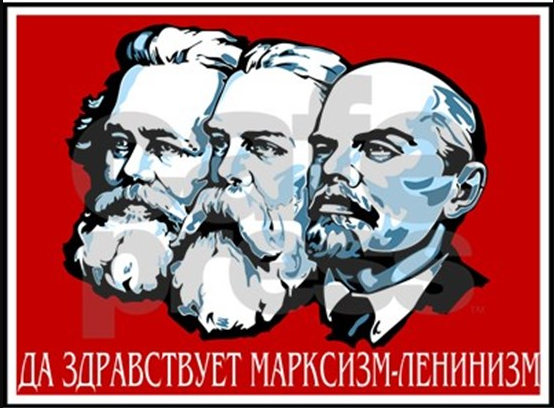Since early childhood, I remember the emblem of three good grandpas: Marx, Engels, and Lenin.

I thought that because of how good they are, all three of them live in Kremlin and during the new year, dress like Santa Clauses and bring children presents. Gradually my perception of them morphed into the vision of how Uncle Marx sits in the library and works, and Uncle Engels brings him hot food, and they both eat and talk about the problems of the World’s proletariat. They talked about how capitalists become rich, exploiting workers, how they took the money that their ancestors gained by unlawful activities, and invested this money in a building structure, equipment, and workers’ wages.
However, after capitalists sell the product, there is a difference between the sales and expenses called a surplus. Instead of sharing this surplus among all the workers, capitalists pocket it, thus exploiting workers’ labor for their benefits.
So the two good uncles discussed how all the proletarians of the World should get together and make a great revolution. During this revolution, proletarians put capitalists of the World to stand in the corner. Then, having realized how bad was their behavior, capitalists would change and join all the progressive humanity doing free and fruitful labor for the good of everyone.
Then came Uncle Lenin and said, “Why wait for all the countries to get their act together when we can make communism in Russia first?” Uncle Marx and Uncle Engels slapped themselves on the forehead and laughed, “What a great idea, Uncle Lenin!” Thus, came the great Soviet Union, that quoting the words of the famous Soviet song “has many forests, fields and rivers” and where, as a lyrical protagonist points out, “I don’t know of any other country, where a person breaths so freely!”
The theoretical factor
So Uncle Marx suggested that if all the workers (proletarians) of the World got rid of all the capitalists as a class, they can manage their labor themselves and thus divide the surplus equally among everyone. That’s what my school taught me.
However, my school missed informing me about a couple of considerations, and when I came to the USA, I had to learn about them the hard way.
Besides the above-stated image of capitalist pocketing the surplus, an entrepreneur also has to come up with an idea, organize the business, and take the risk.
The process of coming up with an idea is difficult. An idea has to fill the existing demand or create a new one, and at the same time, it should be something that other people on the market don’t already do or have, or do the same thing better and cheaper. In other words, entrepreneurs should find their niche.
As far as organization talent is concerned, some people are born to be organizers while some are destined to work 9 to 5 for someone else. I tried it but didn’t go far. Maybe it’s my socialistic upbringing to blame, but even working like a dog, way beyond 9 to 5, I couldn’t quite make it in a big way.
I honestly hated to deal with licenses, permissions, regulations imposed by a particular field, by state or federal government. And then you have to somehow design, develop, and test the product. And then, Oh’ Boy... I found out how much of the budget goes toward advertising.
And after all that financial, intellectual, and emotional expense, the idea might not work. So many start-ups fail, or, like in my case, that barely making it.
Then thinking about it, 9 to 5 people might lose their jobs. It happened to me too. Still, they could turn around and find another one.
As for entrepreneurs… all their livelihood could go down the drain. So it is not for nothing that entrepreneurs enjoy the surplus. I didn’t know that. No one told me.
Besides, no one forbids several or several thousand workers to get together, go through the same steps as a single entrepreneur does, and then, in the case of success, divide the profits between everyone who carried the risk. These types of projects do exist in a capitalistic society.
Socialism is something else.

